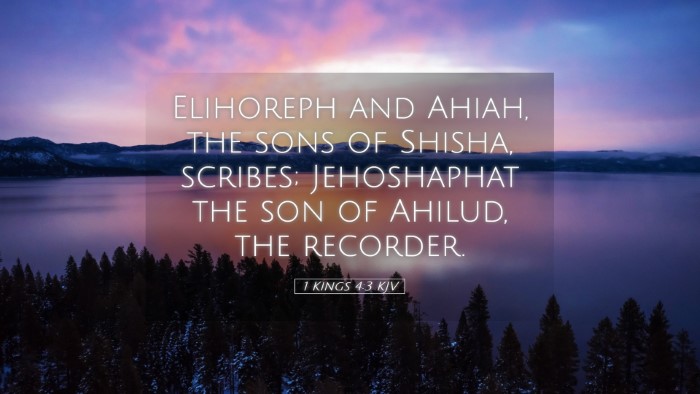Commentary on 1 Kings 4:3
This verse reads: "Elihoreph and Ahijah, the sons of Shisha, scribes; Jehoshaphat the son of Ahilud, recorder." In this brief passage, we see a glimpse into the administration of King Solomon, highlighting the significance of record-keeping and the roles assigned to various officials.
Understanding the Context
The context of this verse is found within the broader narrative of Solomon's reign. After the establishment of peace and the consolidation of his kingdom, Solomon set about organizing his government. This verse points to the importance of having skilled individuals in key administrative roles.
The Significance of Scribes
Matthew Henry emphasizes that "scribes" were essential to the administration of any kingdom. Their role in recording events and decisions was critical for governance and historical record. The scribes mentioned, Elihoreph and Ahijah, were likely responsible for documenting the king's decrees and the nation's legal matters.
The Role of the Recorder
Albert Barnes notes that Jehoshaphat, as the "recorder," had a distinct responsibility. The recorder's office was akin to that of a modern-day historian and secretary combined. Jehoshaphat would have been responsible for maintaining the king's records and possibly even overseeing judicial matters.
Theological Insights
This passage reveals much about God's order in governance and the establishment of society. Solomon's choice to appoint wise and capable individuals highlights the Biblical principle that leaders should surround themselves with wise counsel. Adam Clarke points out the necessity of having competent people in positions of authority to ensure justice and order in the kingdom.
Government and Divine Order
As theologians, we can derive a significant principle from this organization; that God desires order in all aspects of life, including governance. The appointment of skilled men to serve the king reflects the understanding that human authority should work in concert with divine principles. Pastors and church leaders today can glean the importance of surrounding themselves with wise counsel for their ministries.
The Purpose of Record Keeping
The work of scribes and recorders not only facilitated good governance but also preserved history. This act of documentation is vital for understanding the faithfulness of God throughout generations. As Christians, we are called to remember and recount the faithfulness of the Lord, much like the scribes did in ancient Israel.
Practical Applications
- Wisdom in Leadership: Leaders should prioritize wisdom in their decision-making processes. Surrounding oneself with knowledgeable advisors can result in more effective governance and ministry.
- Valuing History: There is a need to value history and preserve it, especially concerning the work of God among His people. Christians should take time to document their faith stories and the heritage of God's faithfulness.
- Ensuring Order: As God is a God of order, Christians are called to maintain orderliness in their lives, including in their families, churches, and communities. This includes organizing thoughts, practices, and governance to reflect God’s nature.
Conclusion
In conclusion, 1 Kings 4:3 is a powerful reminder of the importance of wise administration, the role of skilled individuals in leadership, and the necessity of keeping accurate records for future generations. The insights garnered from public domain commentaries by Matthew Henry, Albert Barnes, and Adam Clarke provide a robust foundation for understanding the implications of this verse in a modern context. As we reflect on this, may we seek to implement these Biblical principles in our lives, ministries, and governance.


